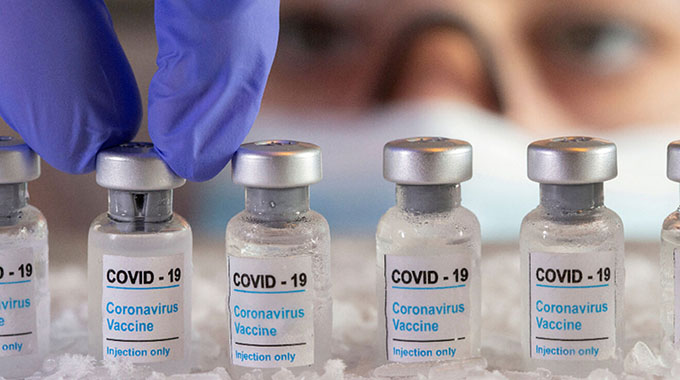Let’s jump-start Africa’s industrial revolution

Ivor Ichikowitz
Correspondent
The push to increase the Covid-19 vaccine supply in Africa, restarting economic growth in a post-coronavirus world and concurrently, the need to end conflicts in the Sahel region, are critical missions that might not seem related at all.
However, they are all closely tied to the necessity of nurturing Africa’s domestic manufacturing capabilities.
In truth, the development of indigenous manufacturing will save African lives in the future, whether it is in terms of decreasing the potential for conflict or lessening the burden of public health crises.
With the UK’s purchase of 60m Pfizer vaccines, at a time of global vaccine scarcity, the Western world has sent a message to the Global South: you are on your own.
It’s a message, frankly, that is difficult to hear, but it is better for the future development of African countries if they hear it loud and clear.
More than half of Britain has received their first vaccination dose, and the UK, along with other wealthy countries, has already secured contracts for tens of millions of further doses.
This is at a time when no more than two per cent of Africans have been vaccinated.
In South Africa, that rate is 0,5 percent.
Some former British colonies, like Somalia, have only in March received their first vaccine supplies, from COVAX.
Even the news that the US will share 60 million excess doses of AstraZeneca doses with countries in need underscores the fact that America was hoarding so many vaccines in the first place.
Dr Ayoade Alakija, co-chair of the Africa Vaccine Delivery Alliance, put it bluntly when she said, “there are no vaccines”, and then warned of an India-level catastrophe.
A 2019 report published by Frontiers in Public Health found there is an undeniable demand for vaccines on the African continent and that feasible business models exist if they can overcome challenges.
Many business and government officials interviewed emphasised capacity building.
“Vaccine manufacturing remains complex and requires a highly integrated set of well-coordinated activities, including a highly skilled workforce, [an] elaborate supply chain for many specialty reagents and consumables, exquisite quality control, and appropriately trained and staffed regulatory agencies,” the paper stated.
In short, Africa needs to build up its own infrastructure to make vaccine production scalable and more cost-effective.
And yet, coronavirus isn’t the only crisis to demonstrate the critical need for domestic supply chains and the fragility they face.
Pandemic feeds instability
The Covid-19 pandemic has exacerbated upticks in unrest and violence in places like Chad, Mali and elsewhere in the Sahel region, as well as around the world.
Most recently, former Chad President Idriss Déby was killed while visiting soldiers on the frontlines of the fight against radicalism, just one day after he was announced as the winner of the nation’s Presidential election. Meanwhile, in south Chad, thousands of refugees have crossed the border from Darfur in the wake of clashes between Masalit and Arab tribes over resources.
Organised extremist insurgents routinely flow across country lines, taking advantage of instability, and fighting in different nations depending on the changing realities — just like diseases spreading across our continent’s borders.
Look to Mozambique, where continued unrest has threatened an investment of $20 billion from French energy giant Total SE, which recently suspended its liquefied natural gas (LNG) project indefinitely due to an escalation of violence in the area.
Again, much like a pandemic, unabated conflict threatens to destabilise whole economies.
We must however find opportunity out of challenge; optimism out of fear. This is Africa’s legacy and should be our badge of honour.
Both the scenarios I’ve outlined should serve as the impetus to jump-start Africa’s 21st-century industrial revolution, bolstering the continent’s domestic vaccine production to fight the spread of Covid-19, and safeguarding our countries’ economies from threats which jeopardise their development.
Sea change in attitudes
Already some African countries are making or considering partnerships to manufacture vaccines domestically — Algeria announced that it will begin production on the Sputnik V vaccine in September, which will be directed to the African market; Rwandan President Paul Kagame is committed to getting an mRNA vaccine into production in-country; and Moderna CEO Stéphane Bancel has been meeting with African leaders about the prospect of opening up factories.
These are terrific milestones and multilateral dialogues which signify a sea change in the way African leaders operate.
In 2021, those leaders want to control their own destiny as opposed to having it dictated to them.
In South Africa, placing an emphasis on indigenous manufacturing has helped the Rainbow Nation’s economy participate in the global technology revolution.
It has reinvigorated South Africa’s automotive industry, with 37 percent of the value of a South African car today manufactured in South Africa.
Under the South African Automotive Master Plan (SAAM), the country hopes to push the figure to 60percent.
In turn, Chad’s Industrialisation and Economic Diversification Masterplan aims to increase the country’s growth rate to 8percent per year by 2030. The African Continental Free Trade Area (AfCFTA) which opened on 1 January, with 54 of the 55 AU member countries participating, has ushered in tremendous, mutually beneficial opportunity — Africa’s manufacturing sector could hit over $660 billion by 2030, $200 billion more than in 2015.
The green-energy revolution also offers a chance for African manufacturing to transform its future. Beyond its vast natural resource wealth (Africa has more than $82 trillion in discovered natural resources), the continent is blessed with a particular abundance of ‘strategic minerals’.
One of these is lithium, an essential component in making batteries for use in electric vehicles or ‘EVs’.
In 2018, Zimbabwe, the Democratic Republic of Congo (DRC) and Namibia were among the top countries for global lithium production, with Zimbabwe holding 11 million tonnes of lithium ore in just one of its Bikita mines. Hadley Natus, chairman of Tantalex Resources Corp, rightly stated that, “Africa needs to become the ‘go to’ continent rather than the ‘take from’ continent.”
Advanced manufacturing demands in Africa, such as in mining technology, renewable energy, agro- and health sciences, and water management are enormous; thus, there is enormous profit to be made.
Local manufacturing in Africa is unsurprisingly attracting large-scale investments both from countries within the continent, like Nigeria’s Dangote Group and BUA Group, as well as big American manufacturers like Ford.
Programmes like ‘Manufacturing Africa’ are linking businesses with investment and stakeholders. That programme, entering its third year, has already struck over 800 deals.
In the brave new world that Africa faces, at the precipice of global economic recovery post-Covid-19, Africa must no longer rely on the words ‘Made in China’.
We must not ask ourselves, years from now, “why didn’t we act” in light of such tremendous opportunity. —New African
Ivor Ichikowitz is an African industrialist and philanthropist, sponsor of the acclaimed African Youth Survey which is held annually and is one of New African’s 100 Most Influential Africans of 2020.








Comments